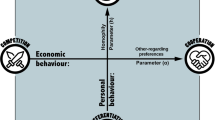Abstract
The present work deals with an initiative that aims at creating and promoting rural development through high quality. It is called “Presidia”, it has been started by the Slowfood movement, and it relies on an approach to rural economies different from the standard spreading of industrialization. The phenomenon on focus is based upon the cooperative dynamics of several small producers, and thus some criticalities typical of social dilemmas have emerged in the case-based study on the field: they deal with the role played by cooperation-supporting institutions. Through an empirically grounded agent-based model which allows what-if analysis of some policy suggestions, different mechanisms for promoting cooperation among producers are thus investigated. Simulation results outline how single altruistic actions are not capable of sustaining a positive aggregate while single selfish choices can determine very negative outcomes, and how only the strong commitment of most central actors can protect the system from random fluctuations in cooperation levels. Two main results are finally discussed: informal control mechanisms do not ensure the desired level of cooperation and high quality; interaction structure codetermines the outcome.





Similar content being viewed by others
Notes
According to the presidium coordinator and to producers, the mechanism has worked well because it has helped, in the past, in identifying two producers who were not “capable” of following productive regulations and who have been expelled.
References
Andreoni J (1995) Cooperation in public-goods experiments: kindness or confusion? Am Econ Rev 85(4):891–904 (September 1995)
Axelrod R (1984) Evol Cooperat. Basic Books, New York
Burlando RM, Guala F (2005) Heterogeneous agents in public goods experiments. Exp Econ 8:1–20
Doreian P, Woodard KL (1994) Defining and locating cores and boundaries of social networks. Soc Netw 16:267–293
Erev I, Roth AE (2001) Simple reinforcement learning models and reciprocation in the prisoner’s dilemma game. In: Gigerenzer G, Selten R (eds) Bounded rationality. The adaptive toolbox. The MIT Press, Cambridge, pp 215–231
Gilbert N (2008) Agent-based models. Sage Publications
Gilbert N, Troitzsch KG (2005) Simulation for the social scientist. Open University Press, Buckingham (First edition: 1999)
Kahan DM (2005) The logic of reciprocity: trust, collective action, and law. In: Gintis H et al (eds) Moral sentiments and material interests. The MIT Press, Cambridge, pp 339–378
Laland KN (2001) Imitation, social learning, and preparedness as mechanisms of bounded rationality. In: Gigerenzer G, Selten R (eds) Bounded rationality. The adaptive toolbox. The MIT Press, Cambridge, pp 233–247
Mellers BA et al (2001) Effects of emotions and social processes on bounded rationality. In: Gigerenzer G, Selten R (eds) Bounded rationality. The adaptive toolbox. The MIT Press, Cambridge, pp 263–279
Murdoch J (2000) Networks—a new paradigm of rural development? J Rural Stud 16:407–419
Sadriech A et al (2001) Is there evidence for an adaptive toolbox? In: Gigerenzer G, Selten R (eds) Bounded rationality. The adaptive toolbox. The MIT Press, Cambridge, pp 83–102
Schott J (1991) Social network analysis. A hand book. Sage Publications, Thousand Oaks
Wasserman S, Faust K (1994) Social network analysis. Methods and applications. Cambridge University Press, Cambridge
Acknowledgments
The author acknowledges the staff of Slowfood (Bra, Italy) and of MIAC (Mercato all’Ingrosso Agroalimentare di Cuneo, Italy), Sergio Capaldo and the producers who have been interviewed. Further acknowledges are due to Nigel Gilbert, Peter Hedström and Sara Arber for their useful comments on earlier versions of the work.
Author information
Authors and Affiliations
Corresponding author
Rights and permissions
About this article
Cite this article
Boero, R. Food quality as a public good: cooperation dynamics and economic development in a rural community. Mind Soc 10, 203–215 (2011). https://doi.org/10.1007/s11299-011-0090-9
Received:
Accepted:
Published:
Issue Date:
DOI: https://doi.org/10.1007/s11299-011-0090-9




